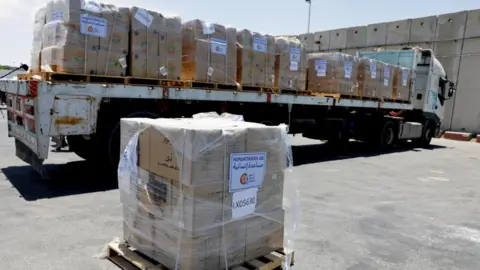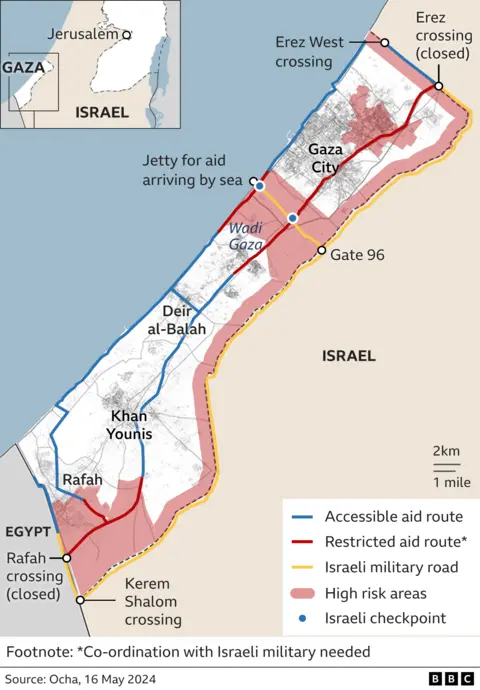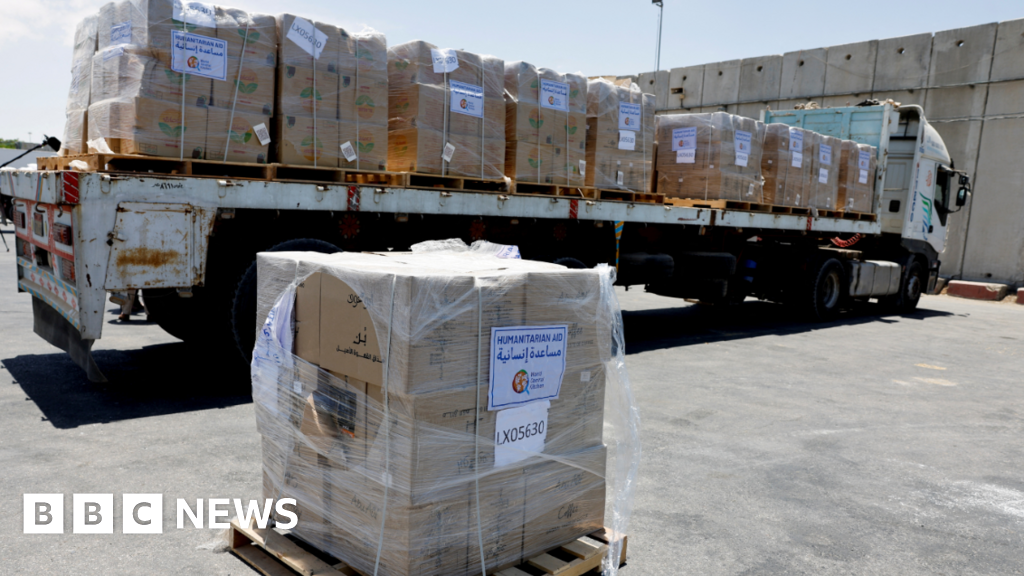By Kathryn Armstrong, BBC News
 Reuters
ReutersThe Israeli military says it will hold a daily “tactical pause of military activity” along a road in southern Gaza to enable more humanitarian aid to enter.
The pauses, which are said to have begun on Saturday, will last from 08:00 local time (05:00 GMT) until 19:00 local time until further notice.
They will only affect a route that leads northwards from the key Kerem Shalom crossing, which Gaza shares with Israel.
Israel has been under continuous pressure from its allies, including the US, to prevent the humanitarian crisis in Gaza from worsening.
The Israel Defense Forces (IDF) said Sunday’s announcement follows “additional related discussions with the UN and international organizations”.
The route of the humanitarian pause leads from the Kerem Shalom crossing in the south of Gaza to the Salah al-Din Road – a main highway – and then northwards to the European Hospital near the city of Khan Younis.
In a post on X, the IDF clarified that there is no ceasefire in the southern Gaza Strip, and combat will continue in Rafah.
Hundreds of thousands of people have fled Rafah since Israeli troops entered it more than a month ago, seizing control of the Gazan side of the Rafah crossing with Egypt and ordering many people to evacuate.
The crossing – once the main point of entry for aid – has been closed since then.
Israel says its operation in Rafah is necessary to oust Hamas from what it calls the group’s “last major stronghold”.
International agencies have warned of a dire humanitarian situation in Gaza and made repeated calls for more aid to be let in.
On Wednesday, World Health Organization Director-General Tedros Adhanom Ghebreyesus said a significant proportion of Gaza’s population was facing “catastrophic hunger and famine-like conditions”.
The number of aid trucks entering Gaza continues to be well below what agencies have said is required.
The UN’s humanitarian office, known as OCHA, reported that in May, the daily average number of trucks delivering humanitarian aid into Gaza – excluding fuel – was 97. In April that figure was 169 and in March it was 139.
Prior to the outbreak of the war on 7 October, around 500 trucks carrying aid – including fuel – were entering Gaza every day.
OCHA points out that since 7 May, it has been unable to directly observe the arrival of aid from the private sector through the Kerem Shalom crossing.

The IDF said eight Israeli soldiers were killed in an explosion in Rafah on Saturday – the deadliest incident for the army in the war since January.
It happened during an operation in the Tal al-Sultan neighbourhood of Rafah, which has been a key target for Israeli forces in recent weeks.
The armed wing of Hamas said it fired a rocket towards an armoured vehicle after setting up an ambush.
Israeli Prime Minister Benjamin Netanyahu has vowed to continue the war against Hamas, urging Israelis not to let anyone “divert” them from the “clear and simple fact – despite the heavy and shocking price we must stick to the goals of war”.
“Elimination of Hamas’ governmental and military capabilities, returning all of our hostages, making sure that Gaza will not pose threat to Israel and returning our residents safely both in the north and in the south,” he said.
Aid agencies have repeatedly reported difficulties in distributing aid around Gaza. The UN children’s agency Unicef told the BBC on Friday that a convoy carrying aid was denied entry to northern Gaza, despite having all the necessary documents.
Unicef spokesman James Elder, who was travelling with the convoy, said that this had become a common occurrence.
The IDF said paperwork had not been filled out properly and accused Mr Elder of presenting a “partial picture” of the situation.
The war began after Hamas attacked Israel on 7 October, killing about 1,200 people and taking 251 others back to Gaza as hostages.
The Hamas-run health ministry says more than 37,000 Palestinians have been killed since the start of the war, and many hundreds of thousands more have been injured or displaced.
Negotiations over a potential ceasefire and hostage release deal between Israel and Hamas are continuing, with the US announcing on Saturday that Israeli defence minister Yoav Gallant will visit Washington soon for talks.
Earlier this week, Hamas stopped short of accepting a US-backed plan, making counter-proposals on several points.
The plan – which the US says is an Israeli proposal although Israel has not publicly endorsed it – would see a “surge” in humanitarian assistance for Gaza.


